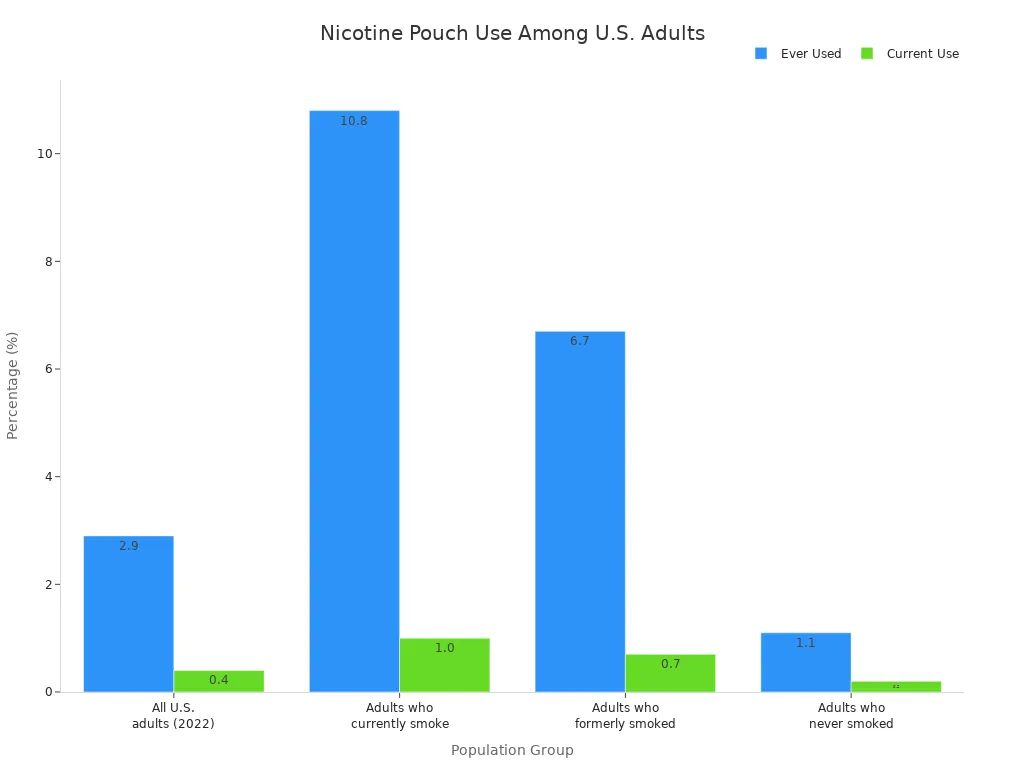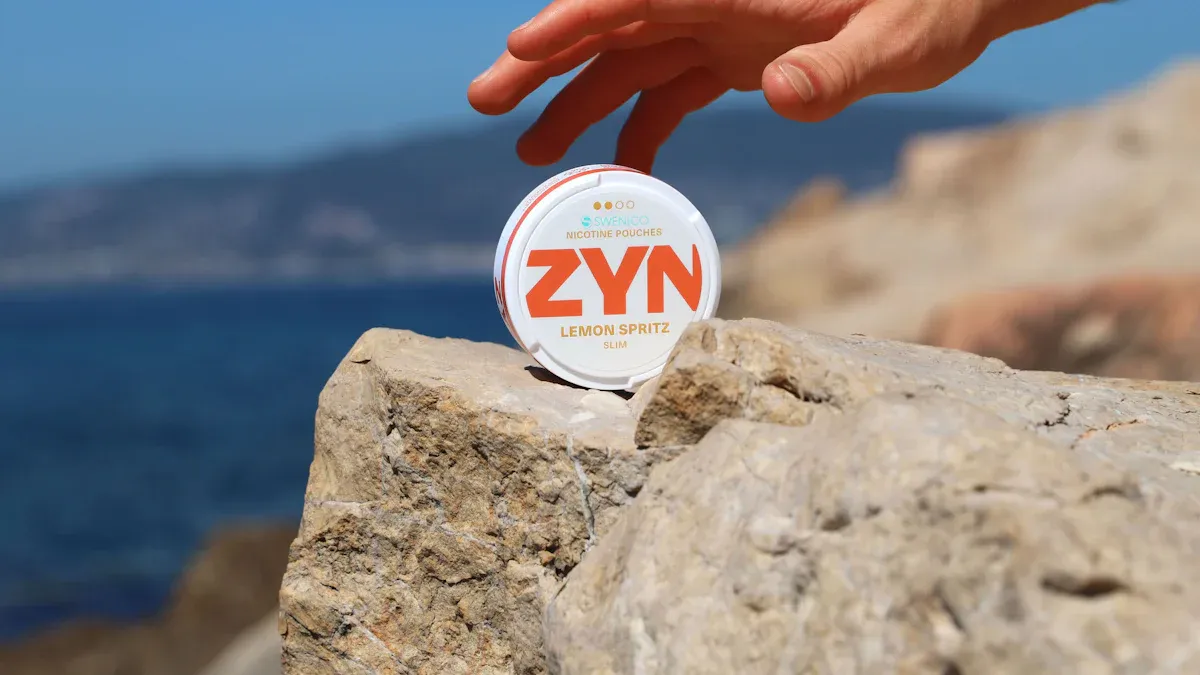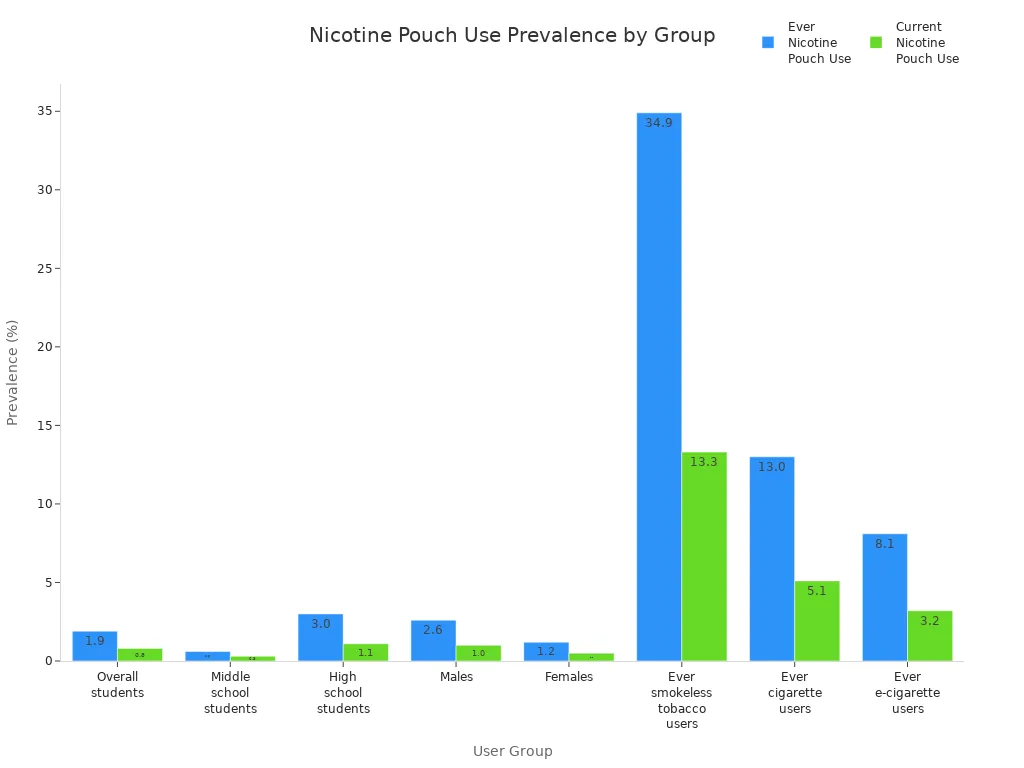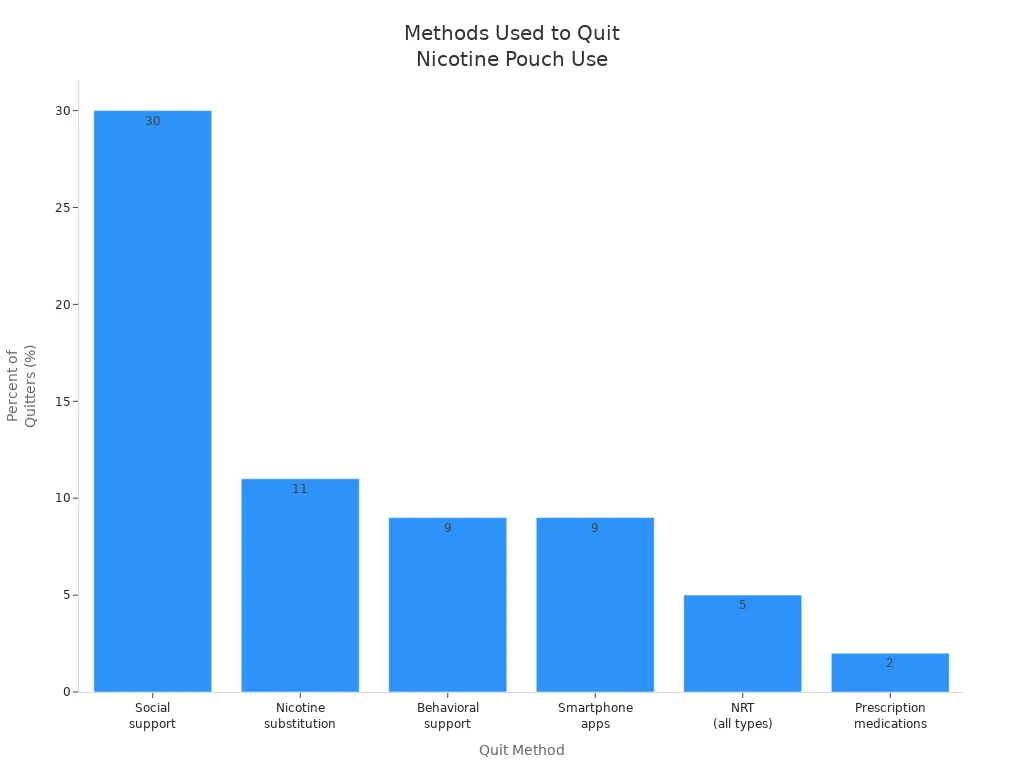Welcome to our website! Call us: +86-18622194621 E-mail: toptac@fancyco.com
Views: 0 Author: Site Editor Publish Time: 2025-07-18 Origin: Site


You might ask if nicotine pouches are bad for you. Nicotine pouches do not have tobacco leaf, but they still give you nicotine. This means you can have health risks. You can get addicted. Your heart and brain can have problems. Young people and pregnant people can be hurt the most. Studies show nicotine pouches have led to more accidental poisonings in children. Not many U.S. adults use them, as you can see in the chart below:

Experts are still learning about the long-term effects of nicotine pouches. We do not know everything yet.
Nicotine pouches give nicotine without tobacco leaf, but they are still risky. They can cause addiction, heart problems, and mouth issues. Young people and pregnant people have the most risk from nicotine pouches. These risks include brain damage and problems for unborn babies. Nicotine pouches can hurt your gums and cause sores. They can also make your heart beat faster. They do not make smoke or vapor. Many people use nicotine pouches with other nicotine products. This makes addiction worse and quitting harder. Getting help from friends, counseling, and safe quitting tools helps you stop using nicotine. This makes quitting safer and more likely to work.

Nicotine pouches are small white packets. You put them between your gum and upper lip. You do not need to chew or smoke them. These pouches do not have tobacco leaf. They use nicotine from tobacco plants or made in a lab. This makes them different from chewing tobacco or snus. Those use real tobacco leaves.
Inside nicotine pouches, there are several things:
Nicotine (from tobacco or made in a lab)
Plant-based fibers
pH stabilizers
Flavorings like mint or fruit
You might also find sweeteners like xylitol or maltitol and preservatives. These ingredients give the pouch its taste and feel. Since they do not have tobacco leaf, they look and feel cleaner than smokeless tobacco. Many people pick them because they want nicotine without tobacco.
Note: Some pouches use synthetic nicotine. This means you can use them with no tobacco at all. That is a big difference from most other nicotine products.
You use a nicotine pouch by putting it between your upper lip and gum. The pouch stays there and slowly lets out nicotine. Your saliva helps the nicotine dissolve. It goes through the lining of your mouth. This is called transbuccal absorption.
Nicotine moves into your blood through tiny blood vessels in your gums. You start to feel it in about 5 to 10 minutes. The pouch keeps giving nicotine for up to an hour. This gives you a steady feeling, not a fast rush. Smoking is different because nicotine reaches your brain in seconds.
Some things can change how much nicotine you get:
How wet the pouch is
How long you keep it in your mouth
The kind of nicotine (nicotine salts work faster)
How your body breaks down nicotine
Nicotine pouches do not make smoke or vapor. You do not breathe in any harmful stuff. This makes them easier to use in many places and more private.

Some people think nicotine pouches are safer than smoking. But they can still make you addicted. Nicotine is strong and changes your brain. When you use these pouches, you may want them more. Many users also use other nicotine products. This makes addiction more likely.
Here is a table that shows how often different groups use nicotine pouches and other nicotine products:
| User Group / Product Use | Ever Nicotine Pouch Use (%) | Current Nicotine Pouch Use (%) | Concurrent Use of Other Nicotine Products (%) |
|---|---|---|---|
| Overall students | 1.9 | 0.8 | N/A |
| Middle school students | 0.6 | 0.3 | N/A |
| High school students | 3.0 | 1.1 | N/A |
| Males | 2.6 | 1.0 | N/A |
| Females | 1.2 | 0.5 | N/A |
| Ever smokeless tobacco users | 34.9 | 13.3 | 41.3 (current smokeless tobacco users) |
| Current smokeless tobacco users | N/A | 41.3 | 41.3 (current smokeless tobacco users) |
| Ever cigarette users | 13.0 | 5.1 | 11.5 (current cigarette users) |
| Current cigarette users | N/A | 11.5 | 11.5 (current cigarette users) |
| Ever e-cigarette users | 8.1 | 3.2 | 6.9 (current e-cigarette users) |
| Current e-cigarette users | N/A | 6.9 | 6.9 (current e-cigarette users) |
| Current nicotine pouch users using ≥2 tobacco products | N/A | N/A | 52.6 |
You can see that many people who use nicotine pouches also use other products. This makes it easier to get addicted. Signs of addiction are using more than you planned, wanting pouches badly, and needing stronger ones. If you try to quit, you might feel nervous, grumpy, or have trouble sleeping.
Some common signs of nicotine addiction from pouches are:
Mouth or gum pain
Feeling sick to your stomach
Headaches or feeling dizzy
Faster heartbeat
Hard time paying attention
Mood changes
Note: Using more than one nicotine product at the same time can make addiction worse and harder to quit.

Nicotine pouches can hurt your mouth and heart. When you put a pouch in your mouth, it can make your gums sore. You might see redness, pain, or even sores where you put the pouch. Over time, your gums can pull away from your teeth. This is called gum recession. If you do not treat it, you could lose teeth or get gum disease.
Some people get white spots or patches in their mouth. These changes can sometimes turn into bigger health problems, like oral cancer, but the risk is lower than with smoking or chewing tobacco. Nicotine pouches do not have tobacco leaf or sugar, so they do not stain your teeth or cause bad breath as much as other products.
Nicotine can also affect your heart. When you use a pouch, your blood pressure and heart rate go up for a short time. If you already have heart problems, this can be risky. High amounts of nicotine can make these effects stronger. Some studies show that quitting nicotine pouches can make your blood pressure stay high for months. Scientists are still learning about how they affect your heart over time.
If you notice mouth sores, bleeding gums, or chest pain, you should talk to a doctor or dentist.
Nicotine pouches are extra risky for young people and pregnant people. If you are a teen or young adult, nicotine can hurt your brain. It can make it harder to focus, learn, or remember things. Nicotine also makes your brain want more, which can lead to addiction. Many young people who use nicotine pouches also try other tobacco products.
Nicotine can cause:
Problems with memory and learning
Mood swings and irritability
Trouble sleeping
Headaches and stomach upset
If you are pregnant, nicotine can hurt your baby. It can make your baby be born too early or too small. It can also cause birth defects or even stillbirth. Nicotine lowers blood flow to the baby, which can slow growth and harm the brain. Doctors say you should not use any nicotine products during pregnancy.
Flavored nicotine pouches and ads can make these products more appealing to young people, increasing the risk of addiction and health problems.
Scientists do not know all the long-term health risks of nicotine pouches yet. These products are new, so there are not many studies on what happens if you use them for many years. Some early research shows that nicotine pouches can cause mouth irritation and changes in the cells of your mouth. Using them for a long time may lead to gum disease or other mouth problems.
Nicotine pouches have fewer harmful chemicals than cigarettes, but they still have some things linked to cancer. Some pouches have more nicotine than the label says, which can make side effects worse. No studies show that nicotine pouches help people quit smoking for good.
You should remember that just because nicotine pouches are less harmful than smoking, they are not risk-free. The safest choice is to avoid all nicotine products if you can.
You might wonder how nicotine pouches compare to smoking. Cigarettes have thousands of chemicals. Many of these can cause cancer. When you smoke, you breathe in these chemicals. They can hurt your lungs and heart. Smoking is a big cause of cancer and heart disease. Nicotine pouches do not have tobacco leaf. They also do not make smoke. You do not breathe in tar or carbon monoxide. This means you may have less risk of lung cancer or breathing problems.
Experts say nicotine pouches might lower your cancer risk compared to cigarettes, but they are not safe. Some pouches have as much or more nicotine than a cigarette. This can make addiction stronger. You still have risks to your mouth and heart.
Here is a simple comparison:
| Product | Cancer Risk | Respiratory Risk | Addiction Risk | Oral Health Risk |
|---|---|---|---|---|
| Cigarettes | Very High | Very High | High | High |
| Nicotine Pouches | Lower | None | High | Moderate |
Vaping products give you nicotine through vapor. You do not burn tobacco, but you still breathe in chemicals. Some of these can hurt your lungs. You might cough or have trouble breathing. Vaping can also make your blood pressure and heart rate go up. Both vaping and nicotine pouches can cause addiction. This is a bigger problem for young people.
Vaping can expose you to:
Aerosols that can hurt your lungs
Flavoring chemicals with unknown long-term effects
Volatile organic compounds (VOCs)
Nicotine pouches do not make vapor or smoke. You do not get lung risks, but you still get nicotine fast through your mouth. This can make it easy to use them a lot and get addicted.
Both vaping and nicotine pouches can change your brain, especially if you are young. Scientists are still learning about the long-term health effects of both.
Chewing tobacco is another smokeless product. It has real tobacco leaves. This means you get the harmful effects of tobacco. Your risk of oral cancer is much higher. Chewing tobacco can cause gum disease, tooth loss, and white patches in your mouth. You often need to spit when you use it. This can be messy and awkward.
Nicotine pouches do not have tobacco or sugar. You may have a lower risk of cancer and cavities. But you can still get mouth sores, gum pain, and gum recession where you put the pouch. Scientists have not found a direct link between nicotine pouches and oral cancer. But they do cause changes in your mouth that need more study.
Chewing tobacco is known to cause cancer. Nicotine pouches may look cleaner, but they still have health risks.
Nicotine pouches are not safe for young people. Your brain keeps growing during your teen years. Nicotine can change how your brain works. It can make learning and remembering things harder. You might also have trouble controlling your actions. Teens who use nicotine pouches often do worse in school. They may find it hard to pay attention or get good grades.
The Centers for Disease Control says teens get addicted faster than adults.
Nicotine can hurt your brain and cause mood swings.
Some pouches have as much nicotine as 10 to 13 cigarettes.
Companies use sweet flavors and bright colors to attract young people.
Using nicotine when you are young can cause problems with memory and mood. It can also make it harder to make good choices. You might get addicted or have mental health issues later.
Pregnant people should not use nicotine at all. Nicotine can hurt your baby’s brain and body. It can make your baby be born too early or too small. It can also cause birth defects and learning problems as your child grows. Doctors say no amount of nicotine is safe during pregnancy.
Nicotine lowers blood flow to your baby.
Babies exposed to nicotine may not grow well or develop their brains right.
There is no safe amount of nicotine for pregnant people.
To keep your baby healthy, do not use any nicotine products while pregnant.
If you do not use tobacco or nicotine, do not start. Nicotine pouches do not have tobacco leaf, but they still have nicotine. You can get addicted quickly. Some people feel nervous or get mouth sores from using them. We do not know all the long-term effects yet.
Non-smokers who start using nicotine can get addicted.
Side effects include a faster heartbeat and mouth pain.
These products are not made to help you quit smoking.
The best choice is to avoid nicotine completely.
If you do not already smoke or vape, do not start using nicotine. It can lead to addiction and health problems. Staying away from nicotine is safest.
Stopping nicotine can be tough, but you have help. Most people ask friends or family for support. You can also use apps, counseling, or things like gum or patches. Some people use medicine from a doctor, but this is not as common.
Here is a table that shows how often young adults use different ways to quit:
| Method | Percentage of Quitters (%) |
|---|---|
| Social support (friends/family) | 30 |
| Behavioral support | 9 |
| Smartphone apps | 9 |
| Nicotine replacement therapy | 5 |
| Prescription medications | <2 |
| Product substitution | 11 |
Social support is the most used way to quit. Using both support and medicine helps many people quit for good. Studies say about 24% of people stay quit for a year with both. If you try to quit alone, only about 3% to 5% stay quit.

Tip: Talk to your doctor or dentist. They can help you make a plan and give advice. Doctors use the 5A’s: Ask, Advise, Assess, Act, and Assist.
You do not have to quit by yourself. There are many programs and resources to help. You can get free counseling, join groups, or use text programs. Here are some helpful resources:
| Resource Type | Description |
|---|---|
| Individual Counseling | Free, private sessions to help you make a quitting plan. |
| Behavioral Strategies | Counseling and support to help you change habits. |
| Nicotine Replacement Therapy | Products like patches, lozenges, and gum to ease cravings. |
| Medication Assistance | Medicines that reduce withdrawal symptoms. |
| Quitlines | Call 800-QUIT-NOW for help any time. |
| Text-based Support | Text DITCHVAPE to 88709 for tips and support. |
You can also join programs that send daily tips to your phone. Teens can use websites like teen.smokefree.gov or the "This is Quitting" program. Your doctor can help you find the right resource.
Remember: Quitting takes time. Every step brings you closer to being nicotine-free. You can do it!
Nicotine pouches may seem safer than smoking, but you still face real health risks.
You can get addicted quickly.
Your heart rate and blood pressure may rise.
Mouth sores and gum problems can happen.
Cancer risk is not clear yet.
Young people and pregnant people face extra dangers.
Experts suggest you avoid nicotine pouches if you do not already use nicotine. If you want to quit, talk to your doctor and use support programs. Making informed choices helps protect your health and future.
Yes, you can get addicted. Nicotine changes your brain and makes you want to use it more. Even if you do not smoke, using pouches can lead to strong cravings and withdrawal symptoms.
Nicotine pouches do not have smoke or tar. This means you avoid lung damage from smoking. You still face risks like addiction, gum problems, and heart issues. No nicotine product is completely safe.
Some people try pouches to stop smoking. Doctors do not recommend them as a quitting tool. You should use approved methods like patches, gum, or counseling for the best chance to quit.
Swallowing a pouch can be very dangerous for children. They may feel sick, vomit, or have trouble breathing. You should call poison control or a doctor right away if this happens.